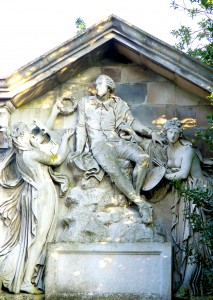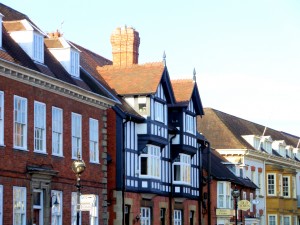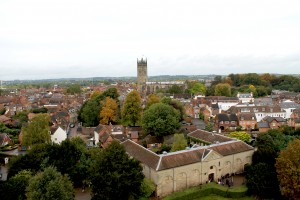Last spring when the emails about participating in the English students’ annual Stratford trip started circulating around, I decided that I had worked hard enough to deserve a break. Of course I always feel guilty when missing out on classes, which is why a study trip was the perfect middle ground: I could go gallivanting around England instead of sitting in class but I would also be attending workshops and studying Shakespeare.
Our group leader, Nely Keinänen, shed some light on the background of the trip that has now become almost a tradition for the department: “The Stratford trips were started by my predecessor, Lotte Troupp, in 1989. When Lotte retired in 1993 and I took over her position, I took over the trips as well. When the courses first began, they were part of an advanced option course in literature, so the class would read the plays which were going to be seen, and prepare for the trip more thoroughly than we do now. I kept up this tradition as long as I could, but at some point it began to get a little more difficult for me to coordinate trips with teaching.” Even now we did get credits for the trip after writing a Shakespeare-themed essay, so it wasn’t all for fun.
During the first day of the Stratford excursion, a dreary drizzle announced our arrival to England. Our trip started from London where we stayed for a three-day weekend. The shabby hotel was no picnic but luckily most of our time was spent elsewhere: already on the first night we went to see our first Shakespeare play Much Ado about Nothing. James Earl Jones impressed us on a big stage with his booming voice, and the play was an entertaining start for the trip. It would’ve been hard not to get excited over the following week.
The following day I ended up missing out on most of the museum tours lined up for us in favor of a Harry Potter studio tour. While others enjoyed a visit to the Houses of Parliament, I learned how the goblins of Gringotts were made and shopped around for wands. Equal fun, I suppose.
The rest of the weekend included two plays in the famous Globe Theater: Midsummer Night’s Dream and Macbeth. Both were absolutely stunning. The humor and playfulness in Midsummer Night’s Dream was astounding, and the bad taste that a forced study of Macbeth had left in my mouth during high school was washed away by the first sounds of war drums on the stage. There was also a surprise in store for me: I’m a fervent Lord of the Rings geek so imagine my delight when I spotted Billy Boyd in the role of Banquo. My inner fangirl was squealing for the rest of the night.
After the weekend we packed our bags again and headed to our bus. When we arrived in Stratford we settled into our charming inn – called Forget-me-not, how adorable is that! – and reveled in the fact that the room was bright and cozy unlike our hotel room in London.
During our time in Stratford we had our schedules filled up with lectures and workshops. Everyone seemed to have the voice class jitters – I guess public speaking might not be the strong suit of us academic types. In directing class we managed to stage a scene from Richard II although I doubt that any of us will win an Oscar anytime soon. My personal favorite was a wigs and makeup workshop where the animated and sprightly instructor showed us how to produce all those gory effects that you might see in the murder and mutilation scenes of Titus Andronicus. Yours truly got to dress up as a pirate with a scarred face while another group member donned Cleopatra’s majestic costume. Embarrassing photos were taken and naturally uploaded on Facebook – it was the epitome of group bonding. Even Nely remembered the wigs and makeup class as a special favorite from previous visits. She had once even volunteered to get a bruise: “So the makeup artist is patting my face with various waxes and colored powders and whatever, and then she takes a small knife and draws a big cut in the wax, which she fills with blood. I don't feel anything, or indeed it sort of tickles, but suddenly the whole group lets out a big "ugghhhh" and I know I must look pretty bad.” I can now relate to Nely’s feelings after witnessing the surprise on everyone’s faces after receiving a scar on my face.
While going around town in the evenings we found the doors closed – all of them. Nothing was open after 5 pm. I don’t think I’ve spent that much time in pubs in my entire life. Now I understand why everyone is always going to the pub in Emmerdale: there’s nothing else to do. During the days we went around to see everyone’s house that was somehow related to Shakespeare. It’s too bad that now I can’t even tell the difference between those buildings when I look at pictures from the trip.
The theater in Stratford was remarkable: Richard II was an extra special treat for any Doctor Who fan thanks to the talented David Tennant. I had a hard time trying to stifle the giggles over his curly hair extensions though. The choir sung like angels (no matter how cheesy that sounds, it’s true!) and the costumes were incredible. The other plays – Shakespeare’s Titus Andronicus, Voltaire’s Candide and Middleton’s A Mad World, My Masters – didn’t disappoint either.
An after-performance trip down to The Dirty Duck, a picturesque pub across the street from the Royal Shakespeare Theatre, was an absolute must. Almost as if to commemorate our last evening in Stratford a few of our favorite actors from the plays showed up there and after much giggling and whispering we even managed to take our pictures with them.
It was a sad farewell on our last morning in Stratford: we jumped on the bus early in the morning and spent a lovely day at the Warwick castle before heading for our flight. The whole group went their separate ways, the last ones waving each other goodbye in front of Helsinki-Vantaa airport. It was an amazing trip and a great way to get to know new people from the university – an experience I would recommend to everyone.
There’s just one glitch though: I could have never afforded the trip on my own without the aid of university funding. And this is the case with most students. During the trip we found out from Nely that the funding is ending soon and later she explained more about the situation: “The Department of English used to have more discretionary money in its budget for student travel, back when student travel was a compulsory part of the syllabus. At some point the discretionary budgets were reduced quite a lot, but we were saved by the Research Unit, which won 7 years of ‘Bonus Money’ for the department. At that point the department decided to allocate some of the bonus money for student travel, mainly to keep up the Stratford trip tradition.”
Once Nely knew that the bonus money would end in 2012, she quickly applied for Teachers’ Academy, which gives funding for teachers and their home units. She was appointed to the Academy and got permission to redirect some of the money for the Stratford trips. Nely is concerned that the funding from the Teachers’ Academy is ending after next year and is worried about the future of the Stratford-tradition: “After 2014, I don't know what will happen, and I'm open to ideas and help. There are plenty of organizations one could apply to for money, but in the past they haven't been eager to fund student groups traveling abroad. A corporate sponsor would be nice, as the sums involved are relatively small (about 4000 euros is what we've had recently for students to divide among themselves).”
It’s sad to think that this great tradition is ending because, even though the trip has never lured big masses, it has always had eager participants who want the opportunity to visit England and learn about Shakespeare in some other environment than BritLit courses. The excursion lets the teachers and the students mingle and get to know each other on a more personal basis, which is, according to Nely, a clear highlight of the trip: “I remember a lot of lunches and dinners and walks with students, where you have a bit more time to learn about their lives, what they hope to accomplish in school and later.”
The Stratford trip affords many interpretations and views on Shakespeare that a mere lecture course at the university would not. According to Nely, the trip has expanded her way of thinking each year: “Many times I've been astonished by what other people saw in the play that I didn't, or things that I saw that others missed, or would interpret quite differently. And always Shakespeare's language, washing over you, challenging you, comforting you, the one thing that hardly changes from year to year, production to production. To be or not to be. Out out damned spot. Love is merely a madness. And all the rest.”



